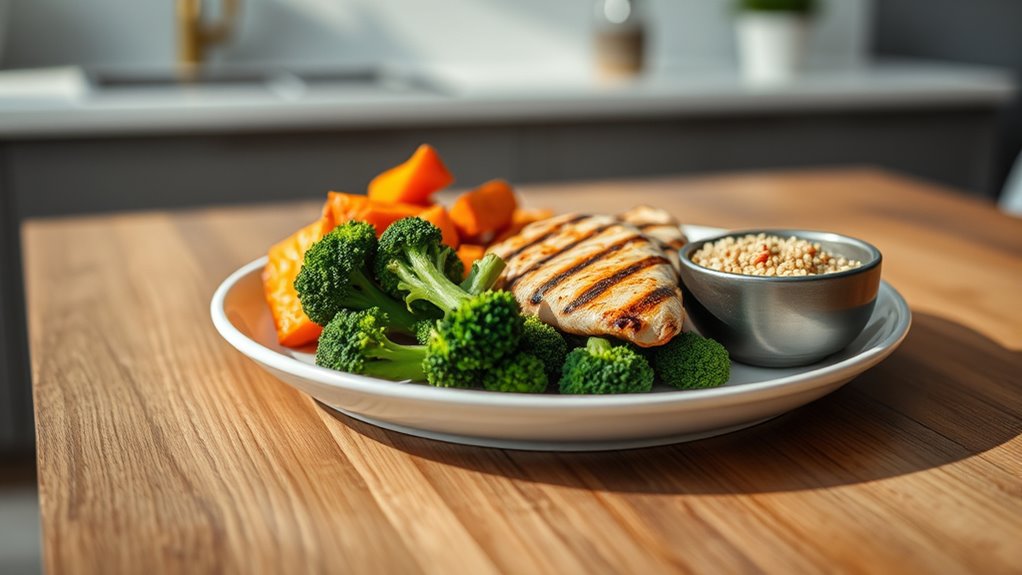Recent studies show that timing your meals correctly can boost muscle gain considerably. Consuming a protein-rich meal within 30-60 minutes after your workout maximizes muscle repair and growth. Spreading protein evenly throughout your day keeps your muscles fueled and prevents breakdown. Aligning your meals with your workout schedule, like having a good pre- and post-exercise snack, enhances recovery. Keep going to discover more effective strategies for optimizing your muscle-building routine.
Key Takeaways
- Consuming a protein-rich meal within 30-60 minutes post-workout maximizes muscle protein synthesis.
- Spreading 20-30 grams of high-quality protein evenly across meals supports sustained muscle repair.
- Aligning meal timing with workout sessions, such as pre- and post-exercise nutrition, enhances recovery.
- Recent studies emphasize the importance of immediate post-exercise protein intake over other times.
- Using data tracking tools can help optimize individual nutritional timing for better muscle gain outcomes.

Maximizing muscle gain isn’t just about what you eat, but also when you eat it. Timing your meals can markedly influence how your body builds muscle, especially around your workouts. One essential aspect is post workout nutrition. After lifting, your muscles are primed to absorb nutrients to repair and grow. Consuming a balanced meal rich in protein shortly after your workout can jump-start this process. Research suggests that within 30 to 60 minutes post-exercise, your muscles are most receptive, so having a protein-rich meal during this window can make a big difference. Protein provides the amino acids necessary for muscle repair, and getting it right at this time can enhance muscle protein synthesis more than at other times of the day. Additionally, tools like data indexing facilitate tracking and optimizing your nutrition and workout data, helping you refine your strategies for muscle gain.
Post-workout meals rich in protein within 30-60 minutes optimize muscle repair and growth.
Another key factor is protein distribution throughout the day. Instead of loading up on a large amount of protein in one meal and skipping others, spreading your intake evenly across your meals ensures a steady supply of amino acids. This approach has been shown to optimize muscle repair and growth, especially when combined with regular strength training. For example, aiming for about 20-30 grams of high-quality protein per meal, spaced every 3-4 hours, keeps your muscles fed and ready to grow. This consistent supply prevents muscle breakdown and promotes a more sustained anabolic environment.
Furthermore, aligning your meal timing with your training schedule can boost results. If you train in the morning, having a protein-rich breakfast can jump-start muscle recovery and set the tone for the day. If you prefer evening workouts, ensure your last meal before training contains enough protein to fuel your session, and follow up with a post workout snack or meal containing protein to maximize recovery. The idea is to synchronize your nutrient intake with your activity patterns, so your muscles get what they need precisely when they need it most.
Ultimately, the latest studies reinforce that meal timing, especially around your workouts, plays a key role in muscle gain. Prioritizing post workout nutrition with immediate protein intake and maintaining a balanced protein distribution throughout the day can help you build muscle more effectively. By paying attention to when you eat and ensuring your meals support your training schedule, you give your body the best chance to recover, grow, and reach your fitness goals faster.
Frequently Asked Questions
Does Meal Timing Affect Long-Term Muscle Growth?
You might wonder if when you eat impacts your long-term muscle growth. While your metabolic rate influences how your body uses calories, recent studies show that calorie distribution throughout the day is more important than exact timing. Focus on consistent, adequate protein intake and overall calorie intake to support muscle gain. Meal timing alone has less effect, so prioritize your daily nutrition to optimize long-term results.
Is There an Ideal Window for Post-Workout Nutrition?
Think of your muscles as a delicate garden needing timely watering. While many believe there’s a strict window for post-workout nutrition, recent studies suggest the old meal timing myths aren’t set in stone. You don’t have to rush; nutrient timing is flexible, and the key is consistent intake. Focus on fueling your body with quality protein and carbs within a few hours, rather than obsessing over an exact post-exercise moment.
How Does Meal Timing Impact Muscle Recovery Speed?
You might wonder how meal timing affects your muscle recovery speed. When you eat soon after exercising, it boosts protein synthesis, helping your muscles repair faster. Timely nutrition also improves nutrient absorption, ensuring your body gets the essential nutrients quickly. This combined effect accelerates recovery, reducing soreness and fatigue. So, eating strategically around your workouts can make a significant difference in how quickly you bounce back and build muscle.
Should I Eat Breakfast if Aiming for Muscle Gain?
You might wonder if skipping breakfast helps or hinders muscle gain. Eating breakfast provides essential nutrients early in the day, fueling your muscles and supporting recovery. Skipping it could lead to missed opportunities for nutrient intake and energy, potentially slowing progress. For muscle gain, enjoying breakfast offers benefits like improved muscle protein synthesis and better overall nutrient distribution, making it a smart choice to include in your routine.
Does Intermittent Fasting Hinder Muscle Development?
Think of fasting effects as a gentle dance with your body’s needs. Intermittent fasting doesn’t necessarily hold back your muscle development; in fact, it can help improve your meal frequency and insulin sensitivity. As long as you’re getting enough protein and calories during your eating windows, your muscles can thrive. Focus on consistency, and you’ll find a rhythm that supports your gains without sacrificing your lifestyle.
Conclusion
Think of your muscles as a garden that needs consistent watering and nourishing. New studies show that timing your meals around workouts can optimize growth, much like watering plants during their peak need. I once ignored meal timing and struggled to see progress, but once I aligned my meals, gains came faster—like a garden blossoming after a well-timed rain. Pay attention to when you eat; it’s the key to opening your muscle potential.









